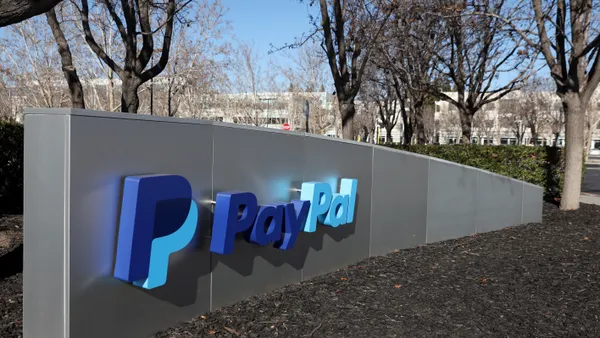Dive Brief:
- Corpay, which provides payments services to corporate clients, may divest its unit that aids companies in managing hotel expenses for employees if it can’t jump-start sluggish revenue growth, according to comments by its top executives.
- The company will “definitely look to divest” the lodging business if revenue growth doesn’t return from a downdraft over the past couple years, Corpay’s new chief financial officer, Peter Walker, said at the Jefferies Fintech investor conference last Wednesday.
- Chief Executive Officer Ron Clarke also noted during an earnings call last month that the unit, which is the company’s third-largest, could be sold, in addition to a couple non-core vehicle businesses that are already up for sale.
Dive Insight:
Atlanta-based Corpay provides its payments software services for managing corporate lodging expenses mainly to companies in North America and the United Kingdom. That includes to airlines and cruise lines managing hotel and housing expenses for crews and stranded passengers, as well as to insurance companies providing accommodations for policyholders who leave their homes in emergency situations.
Corpay’s biggest unit, which delivers payments services for managing large vehicle fleet expenses, generated about $2 billion last year, while its second-biggest segment, which provides corporate payments services, generated about $1.2 billion, according to Corpay’s annual filing with the Securities and Exchange Commission in February. The lodging segment generated $489 million.
Corpay caters to the office of the chief financial officer, Walker noted, seeking to enable companies to better manage their expenses and payments. He joined the company in July as CFO after being appointed in June.
The lodging unit weakness showed up in the company’s second-quarter results and it’s expected to keep being a drag in the second half of the year, Walker said. “Our view was that lodging would improve in the back half, and now we’re expecting it to go a little bit more negative than what it was in Q2,” he said at the Jefferies conference.
Corpay has been trying to revive mid-single-digit to 10% revenue growth for the lodging segment after business declined due to fewer weather emergencies and airline flight snafus.
“We are dependent on emergency and weather events – that drives a lot of volume in lodging, and it’s just been a slower year, thankfully,” Walker said. “It's just coming in less volumes than we thought. That’s obviously potentially subject to change, because nobody controls it.”
But he also noted the company’s sales engine hasn’t been as strong as the company would like. Another new Corpay executive, USA Chief Revenue Officer Mike Jeffrey, is focused on driving more lodging sales momentum, Walker said. Jeffrey was hired about a year ago to that newly created role.
In addition, Corpay has expanded the lodging segment’s sales force and hired a new sales leader, Clarke noted on the second-quarter earnings call with analysts last month. “We have to do better and I think we will,” Clarke said at that time. “But if we don't, we will not be in it long term.”
Asked what that long-term Corpay timing might look like, Baird analyst David Koning said he had not heard a specific date, but he speculated the executives might say at their next earnings reports in November or February.
The CEO “would much rather have two units – one growing 10% and one 17-19%, and talk about 12% blended [growth] than have to worry about the lodging drag,” Koning said by email in commenting on Corpay’s plans.
Aside from the lodging segment sale, the company is also pursuing possible non-core divestitures in its vehicle area that could be “pretty attractive” if the pricing makes sense, Walker said during the Jefferies conference. “We’ll see what the market comes back to us with,” he said.
Clarke had said last month that those vehicle businesses would go on the sales block this month. “We have formally teed up two non-core vehicle divestiture candidates,” with investment bankers already hired, he said in August. “We're hopeful that the net proceeds from these couple of businesses will exceed $1.5 billion,” he added.
The company also disclosed in an August quarterly SEC filing that it’s selling “one of its legacy lower growth private label fuel card portfolios” for about $60 million.
Some of the divestitures are fueling Corpay acquisitions. In July, it agreed to buy London-based cross-border, business-to-business payments business Alpha Group International for about $2.2 billion to expand its corporate payments segment.
“All of this recent M&A activity [is] intended to go deeper, not wider, and again, result in fewer, bigger businesses,” Clarke told analysts on the earnings call.














